
Record numbers of Americans have quit their jobs in recent months. In what has been dubbed “The Great Resignation,” one-in-four U.S. workers left their job in 2021. Much of the exodus is being driven by employee burnout, which often results from spending too much time at work.
Partly in an effort to reduce the likelihood of employee burnout, governments and companies are experimenting with four-day workweeks. Following successful trial runs in Iceland and New Zealand, Scotland is set to implement its own four-day workweek trial period, without pay reduction. The Japanese government actively encourages companies to use the four-day workweek model. Here is a look at how long the typical work week is around the world.
In the United States, meanwhile, the five-day workweek remains the norm. According to the U.S. Census Bureau, American workers in the 16 to 64 age group usually work an average of 38 hours and 48 minutes per week. But how much time people spend at work could depend on where they live, as in some parts of the country, the typical workweek is far longer.
Using metro area-level census data, 24/7 Wall St. identified the U.S. cities with the longest workweeks. Because working-day length can vary considerably for U.S. service members, metro areas where 10% or more of the labor force are in the military were excluded from analysis. In every metro area on this list, the average workweek is more than 39 hours and 30 minutes in length.
Most of the metro areas on this list are located in the South — including 11 in Texas alone. In these places, workers are more likely to hold full-time jobs, defined as 35 hours or more per week by the Census.
Employment in the cities on this list also tends to be concentrated in industries that typically have longer than average work hours. These sectors include resource extraction, utilities, and manufacturing. Here is a look at the companies with the best work-life balance.
Click here to see the cities with the longest workweeks.
Click here to read our detailed methodology.

46. Columbus, GA-AL
> Avg. hours worked per week: 39 hours, 36 minutes
> Avg. travel time to work: 22.2 minutes
> Income per capita: $27,286
> Largest private industry: Education and health services (13.4% of total employment)
In the Columbus metropolitan area, which spans parts of Georgia and Alabama, the average worker logs 39 hours and 36 minutes per week, nearly one hour more than the national average. The longer average working day in the metro area is due in part to the share of local workers who are classified as full-time — defined as 35 hours or more per week by the U.S. Census Bureau. An estimated 80.5% of workers in Columbus are full-time, compared to 78.1% of workers nationwide.
While workers tend to work more hours per week in Columbus, they are also more likely to benefit from shorter commute times. The typical travel time to work in the metro area is just 22.2 minutes, over five minutes below the national average. Over the course of a workweek, the shorter commute adds up to nearly an hour.
[in-text-ad]

45. Oklahoma City, OK
> Avg. hours worked per week: 39 hours, 36 minutes
> Avg. travel time to work: 23.7 minutes
> Income per capita: $32,577
> Largest private industry: Education and health services (15.4% of total employment)
In Oklahoma City, the average workweek is 39 hours and 36 minutes, almost an hour more than the national average. The workweek is longer than average in the metro area despite the education and health services sector accounting for the largest share of employment. Nationwide, those employed in the education and health services industry work an average of 33.2 hours a week — less than in most other sectors.
As is often the case in metro areas with longer than average workweeks, workers in Oklahoma City are more likely than most to be employed full time. Only 19.3% of workers in the metro area are employed part time, compared to 21.9% of workers nationwide.

44. Spartanburg, SC
> Avg. hours worked per week: 39 hours, 36 minutes
> Avg. travel time to work: 23.9 minutes
> Income per capita: $27,969
> Largest private industry: Manufacturing (22.6% of total employment)
Spartanburg is one of four South Carolina metropolitan areas to rank among the U.S. cities with the longest average workweek. The typical worker in Spartanburg logs just over 39 and a half hours a week — about an hour longer than the U.S. average.
Longer than average work days in the metro area are due in part to the types of jobs available. Manufacturing, for example, accounts for over one-fifth of all jobs in Spartanburg, making it the largest sector by employment in the metro area. Nationwide, the manufacturing workers put in an average of about 40 hours a week, more than in most other industries.
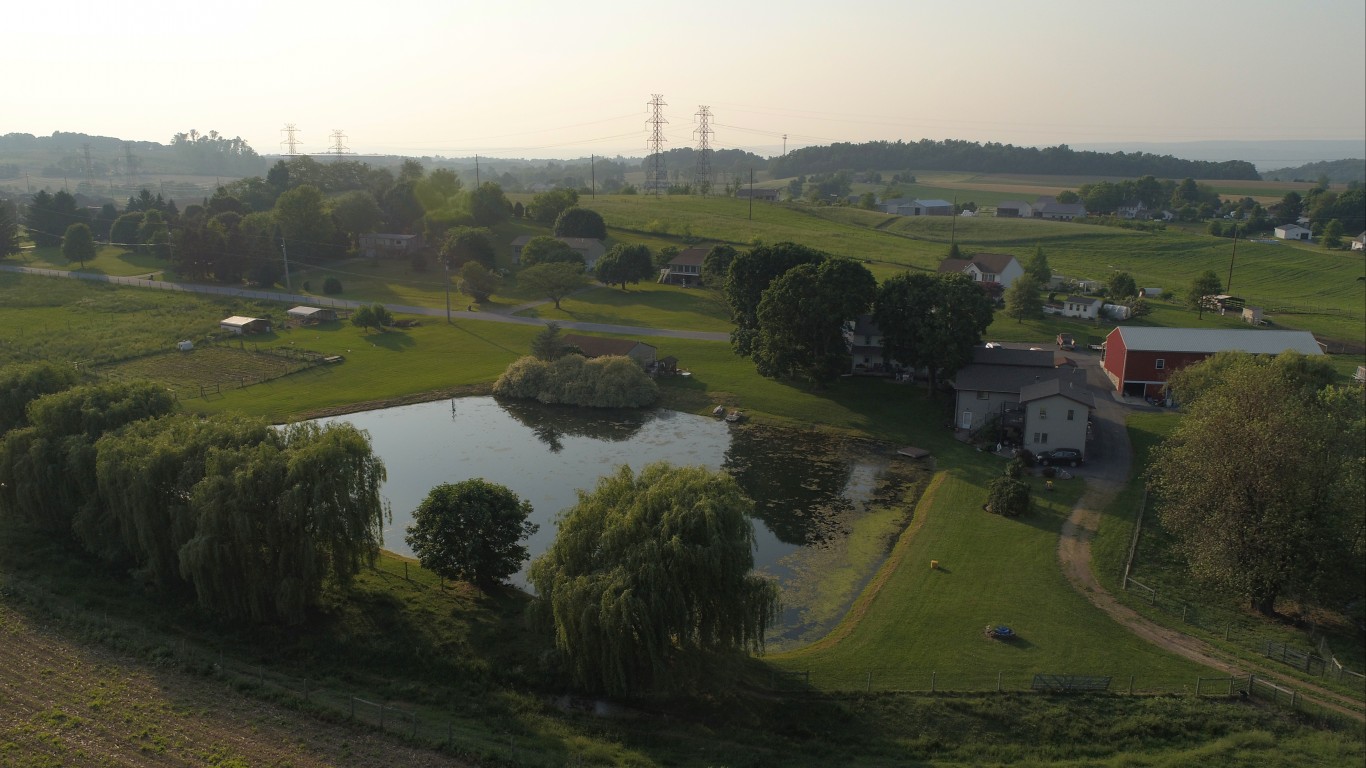
43. Lebanon, PA
> Avg. hours worked per week: 39 hours, 36 minutes
> Avg. travel time to work: 24.1 minutes
> Income per capita: $29,629
> Largest private industry: Manufacturing (17.9% of total employment)
In the Lebanon, Pennsylvania, metropolitan area, the average worker logs 39 hours and 36 minutes per week, nearly one hour more than the national average. The longer average working day in the metro area is due in part to the share of workers who are classified as full time — defined as 35 hours or more per week by the U.S. Census Bureau. An estimated 81.6% of workers in Lebanon work full time, compared to 78.1% of workers nationwide.
Not only do workers in Lebanon put in longer than average days, but local residents are more likely to be working in the first place. The labor force participation rate among the 16 and older population in the metro area stands at 65.1%, compared to the 63.6% national average.
[in-text-ad-2]
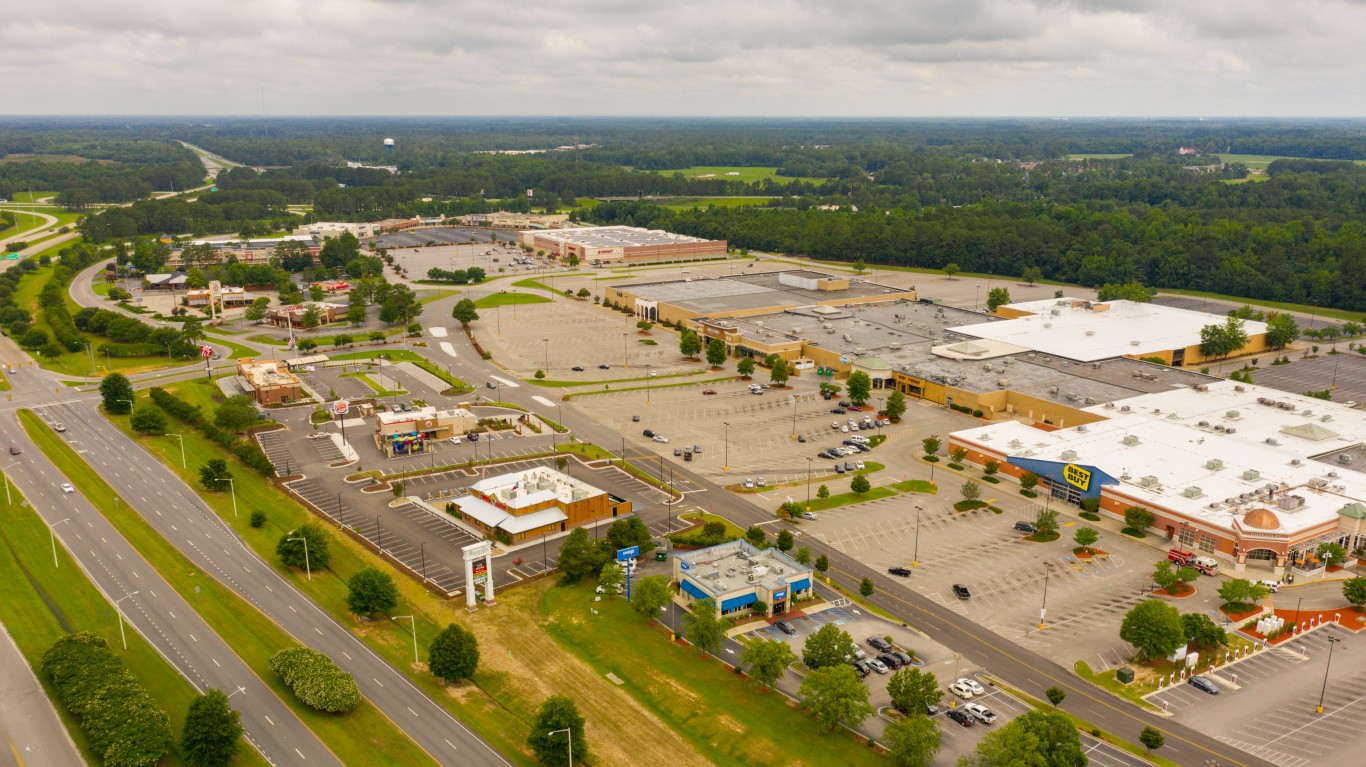
42. Florence, SC
> Avg. hours worked per week: 39 hours, 36 minutes
> Avg. travel time to work: 24.7 minutes
> Income per capita: $25,901
> Largest private industry: N/A
The Florence metro area, located in northeastern South Carolina, has one of the longest average workweeks in the United States. The typical worker in the metro area logs a little over 39 and a half hours per week, nearly an hour more than the national average.
As is often the case in metro areas with longer than average workweeks, workers in Florence are more likely than most to be employed full time. An estimated 83.9% of workers in the metro area are employed full time, one of the largest shares nationwide and well above the 78.1% national average.

41. Michigan City-La Porte, IN
> Avg. hours worked per week: 39 hours, 36 minutes
> Avg. travel time to work: 25.6 minutes
> Income per capita: $28,484
> Largest private industry: Manufacturing (19.6% of total employment)
Michigan City-La Porte is the only metropolitan area in Indiana to rank among the U.S. cities with longest workweeks. The average workweek in Michigan City-La Porte is 39 hours and 36 minutes, almost an hour more than the national average. The workweek is longer than average in the metro area partially because the manufacturing sector accounts for the largest share of employment. Nationwide, those employed in manufacturing work an average of nearly 40 hours a week — more than in most other sectors.
Despite longer than average working hours, incomes are not especially high in the Michigan City metro area. Average income per capita in the area is just $28,484, well below the $35,672 national average.
[in-text-ad]

40. San Antonio-New Braunfels, TX
> Avg. hours worked per week: 39 hours, 36 minutes
> Avg. travel time to work: 27.4 minutes
> Income per capita: $29,802
> Largest private industry: Education and health services (15.7% of total employment)
San Antonio-New Braunfels is one of 11 Texas metropolitan areas to rank among the U.S. cities with the longest average workweek. The typical worker in San Antonio logs a little over 39 and a half hours a week — about an hour longer than the U.S. average.
The longer average working day in the metro area is due in part to the share of workers who are classified as full time — defined as 35 hours or more per week by the U.S. Census Bureau. An estimated 80.3% of workers in San Antonio and New Braunfels are employed full time, compared to 78.1% of workers nationwide.
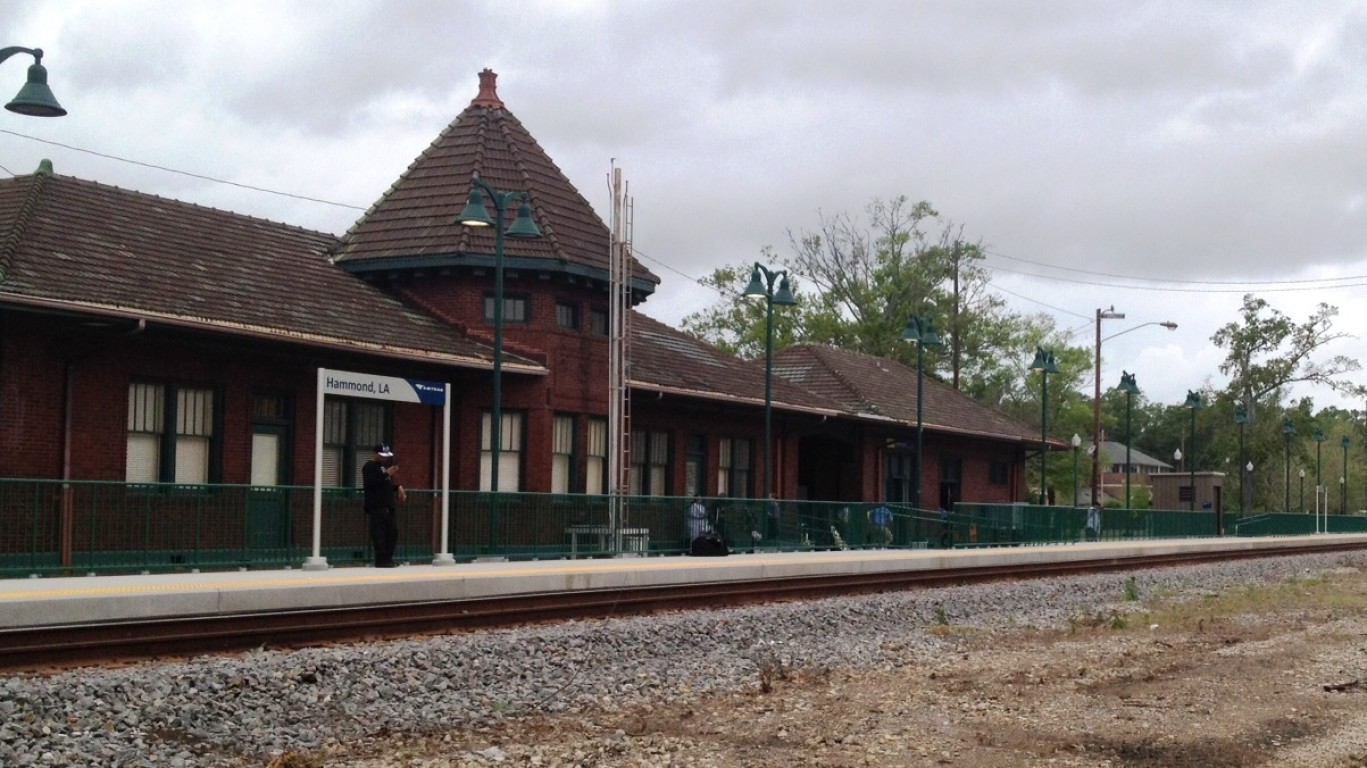
39. Hammond, LA
> Avg. hours worked per week: 39 hours, 36 minutes
> Avg. travel time to work: 31.6 minutes
> Income per capita: $24,217
> Largest private industry: N/A
Hammond is one of four metro areas in Louisiana to rank among the U.S. cities with the longest average workweek. The typical worker in Hammond logs just over 39 and a half hours a week — about an hour longer than the U.S. average. Not only are work days longer than average in the metro, but so too are commute times. The average travel time to work in Hammond is 31.6 minutes, four minutes longer than the national average, which, over the course of a workweek, adds up to over a half hour.
Despite the longer average working hours, incomes are not especially high in the Hammond metro area. Average income per capita in the area is just $24,217, well below the $35,672 national average.

38. Atlanta-Sandy Springs-Alpharetta, GA
> Avg. hours worked per week: 39 hours, 36 minutes
> Avg. travel time to work: 32.5 minutes
> Income per capita: $37,331
> Largest private industry: Professional and business services (19.5% of total employment)
In the Atlanta metropolitan area, the average worker puts in 39 hours and 36 minutes per week, nearly one hour more than the national average. The longer average working day in the metro area is due in part to the share of workers who are classified as full-time employees — defined as 35 hours or more per week by the U.S. Census Bureau. An estimated 81.3% of workers in Atlanta are full-time, compared to 78.1% of workers nationwide.
Perhaps due in part to the longer than average working hours, incomes are slightly higher than average in Atlanta. Average income per capita in the area is $37,331, above the $35,672 national average. The higher incomes are also likely due in part to the area’s industrial composition, as about one in every five area workers are employed in the professional and business services sector — the largest industry in the metro area by employment. Jobs in professional and business services tend to be relatively well paying.
[in-text-ad-2]

37. Fond du Lac, WI
> Avg. hours worked per week: 39 hours, 42 minutes
> Avg. travel time to work: 21.2 minutes
> Income per capita: $33,847
> Largest private industry: Manufacturing (22.6% of total employment)
Fond du Lac is one of two metro areas in Wisconsin to rank among the U.S. cities with the longest average workweek. The typical worker in Fond du Lac logs an average of 39 hours and 42 minutes a week — almost an hour longer than the U.S. average.
Longer than average work days in the metro area are due in part to the types of jobs available. Manufacturing, for example, accounts for over one-fifth of all jobs in Fond du Lac, making it the largest sector by employment in the metro area. Nationwide, Americans employed in manufacturing jobs work an average of about 40 hours a week, more than in most other industries.

36. Jefferson City, MO
> Avg. hours worked per week: 39 hours, 42 minutes
> Avg. travel time to work: 22 minutes
> Income per capita: $29,475
> Largest private industry: Retail trade (10.7% of total employment)
In the Jefferson City, Missouri, metropolitan area, the average workweek is 39 hours and 42 minutes long, nearly one hour more than the national average. The longer average working day in the metro area is due in part to the share of local jobs classified as full-time — defined as 35 hours or more per week by the U.S. Census Bureau. An estimated 82.8% of workers in Jefferson City are employed full time, compared to 78.1% of workers nationwide.
While workers tend to work more hours in Jefferson City, they are also more likely to benefit from shorter commute times. The typical travel time to work in the metro area is just 22 minutes, over five minutes below the national average. Over the course of a workweek, the shorter commute adds up to nearly an hour.
[in-text-ad]

35. Tulsa, OK
> Avg. hours worked per week: 39 hours, 42 minutes
> Avg. travel time to work: 22.2 minutes
> Income per capita: $32,380
> Largest private industry: Education and health services (16.4% of total employment)
The average length of the workweek among all workers ages 16 to 64 in the Tulsa, Oklahoma, metro area is 39 hours and 42 minutes, nearly one hour longer than the comparable national average. Like other metro areas with longer than average workweeks, employment opportunities in Tulsa appear to be disproportionately full time. An estimated 80.3% of metro area workers are employed in full-time positions, compared to 78.1% of workers nationwide.
Manufacturing, a sector that tends to have longer workweeks than most others, is a major employer in Tulsa. More than one in every 10 workers in the metro area are employed in a manufacturing occupation.
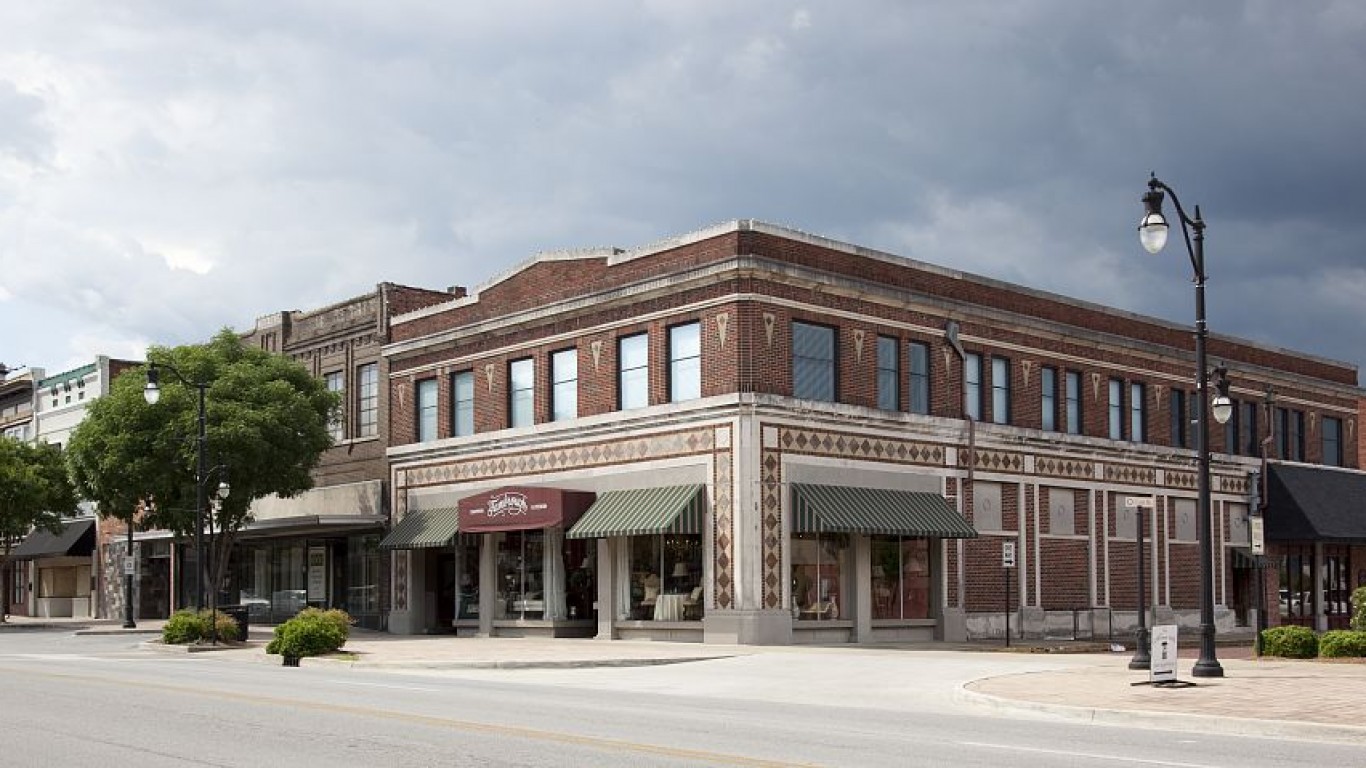
34. Gadsden, AL
> Avg. hours worked per week: 39 hours, 42 minutes
> Avg. travel time to work: 26.2 minutes
> Income per capita: $25,065
> Largest private industry: Education and health services (20.9% of total employment)
The typical workweek in Gadsden, Alabama, is 39 hours and 42 minutes long — nearly an hour longer than the national average. Despite the longer hours, incomes in Gadsden are relatively low. Average income per capita in the metro area is just $25,065, nearly $10,000 less than the national average of $35,672.
Both the longer working hours and lower incomes in Gadsden are due in part to the local industrial composition. The manufacturing sector is one of the largest employers in Gadsden, accounting for more than one in every 10 jobs in the metro area. Nationwide, manufacturing typically pays less by the hour than most other industries and has a longer average working week.

33. Birmingham-Hoover, AL
> Avg. hours worked per week: 39 hours, 42 minutes
> Avg. travel time to work: 28.1 minutes
> Income per capita: $33,131
> Largest private industry: Education and health services (14.0% of total employment)
In Birmingham, Alabama, the average length of the workweek for those in the 16 to 64 age range is 39 hours and 42 minutes — longer than in the vast majority of U.S. metropolitan areas.
As is often the case in places with longer than average workweeks, a larger than typical share of jobs in the Birmingham-Hoover metro area are full time — defined by the U.S. Census Bureau as 35 hours or more per week. By this definition, 80.8% of workers in Birmingham are employed full time, compared to 78.1% of workers nationwide.
[in-text-ad-2]

32. Gainesville, GA
> Avg. hours worked per week: 39 hours, 42 minutes
> Avg. travel time to work: 29.8 minutes
> Income per capita: $32,667
> Largest private industry: Retail trade (9.7% of total employment)
Americans in the Gainesville, Georgia, metro area work an average of 39 hours and 42 minutes per week, more than in most U.S. metro areas and nearly an hour longer than the national average. Commutes also tend to be long in Gainesville. The average travel time to work in the metro area is 29.8 minutes, over two minutes longer than the national average. Over the course of a workweek, the additional commute time adds up to over 20 minutes.
As is often the case in places with longer than average workweeks, a larger than typical share of jobs in the Gainesville metro area are full time — defined by the U.S. Census Bureau as 35 hours or more per week. By this definition, 82.4% of workers in Birmingham are employed full time, one of the larger shares among metro areas and well above the 78.1% of workers nationwide.
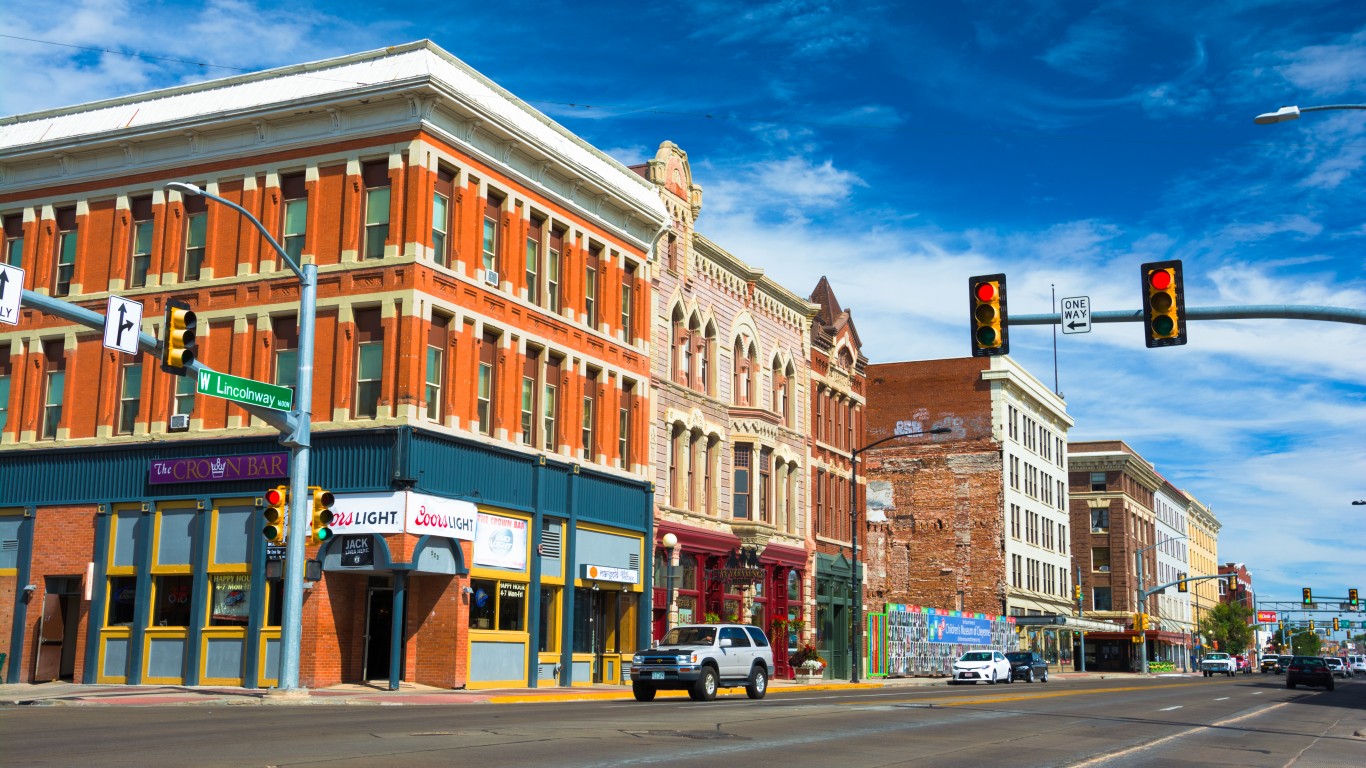
31. Cheyenne, WY
> Avg. hours worked per week: 39 hours, 48 minutes
> Avg. travel time to work: 17.5 minutes
> Income per capita: $39,791
> Largest private industry: Retail trade (11.0% of total employment)
The average length of the workweek in Cheyenne, Wyoming, is 39 hours and 48 minutes — exactly one hour longer than the national average. Like other metro areas with longer than average workweeks, employment opportunities in Cheyenne appear to be disproportionately full time. An estimated 81.2% of metro area workers are employed in full-time positions, compared to 78.1% of workers nationwide.
While workers tend to log more time in Cheyenne, they are also more likely to benefit from shorter commute times. The typical travel time to work in the metro area is just 17.5 minutes, about 10 minutes below the national average. Over the course of a workweek, the shorter commute time adds up to more than an hour and a half.
[in-text-ad]

30. Wausau-Weston, WI
> Avg. hours worked per week: 39 hours, 48 minutes
> Avg. travel time to work: 19.6 minutes
> Income per capita: $32,924
> Largest private industry: Manufacturing (26.0% of total employment)
The average length of workweek in Wisconsin’s Wausau-Weston metropolitan area is 39 hours and 48 minutes, a full hour longer than the national average. Americans employed in the manufacturing sector tend to work longer hours than those in most other industries, and in the Wausau-Weston metro area, more than one in every four workers are employed in manufacturing — three times higher than the share of all U.S. workers in manufacturing occupations.
While workers tend to log more time in Wausau-Weston, they are also more likely to benefit from shorter commute times. The typical travel time to work in the metro area is just under 20 minutes, more than seven minutes below the national average. Over the course of a workweek, the shorter commute time adds up to more than an hour.

29. Montgomery, AL
> Avg. hours worked per week: 39 hours, 48 minutes
> Avg. travel time to work: 22.5 minutes
> Income per capita: $29,094
> Largest private industry: Professional and business services (11.8% of total employment)
In the Montgomery, Alabama, metro area, the average workweek is 39 hours and 48 minutes in length, the longest of any metro area in the state and one of the longest nationwide. Despite working longer than average working hours, incomes are not especially high in the Montgomery metro area. Average income per capita in the area is just $29,094, well below the $35,672 national average.
Like other metro areas with longer than average workweeks, employment opportunities in Montgomery appear to be disproportionately full time. An estimated 82.6% of metro area workers are employed in full-time positions, compared to 78.1% of workers nationwide.
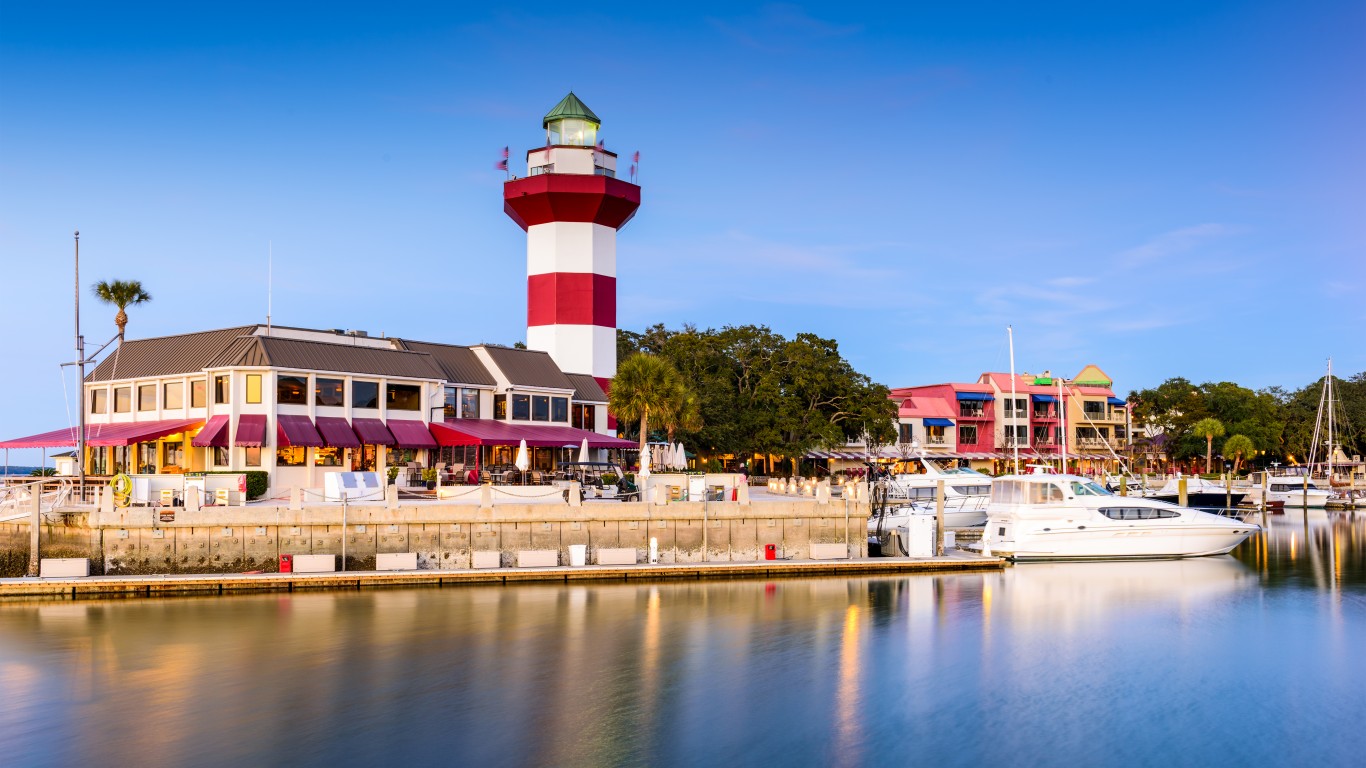
28. Hilton Head Island-Bluffton, SC
> Avg. hours worked per week: 39 hours, 48 minutes
> Avg. travel time to work: 23.3 minutes
> Income per capita: $41,421
> Largest private industry: N/A
The average workweek in South Carolina’s Hilton Head Island-Bluffton metro area is 39 hours and 48 minutes in length — one of the longest in the U.S. and the second longest of any metro area in the state. The longer workweeks in Hilton Head contribute to higher incomes. Average income per capita in the area is $41,421, well above the $35,672 national average.
Though workweeks are relatively long in the Hilton Head Island-Bluffton metro area, a far smaller than average share of the population participates in the labor force. Less than 55% of the 16 and older population in the area are working or actively looking for work, compared to nearly 64% of the working-age population nationwide.
[in-text-ad-2]
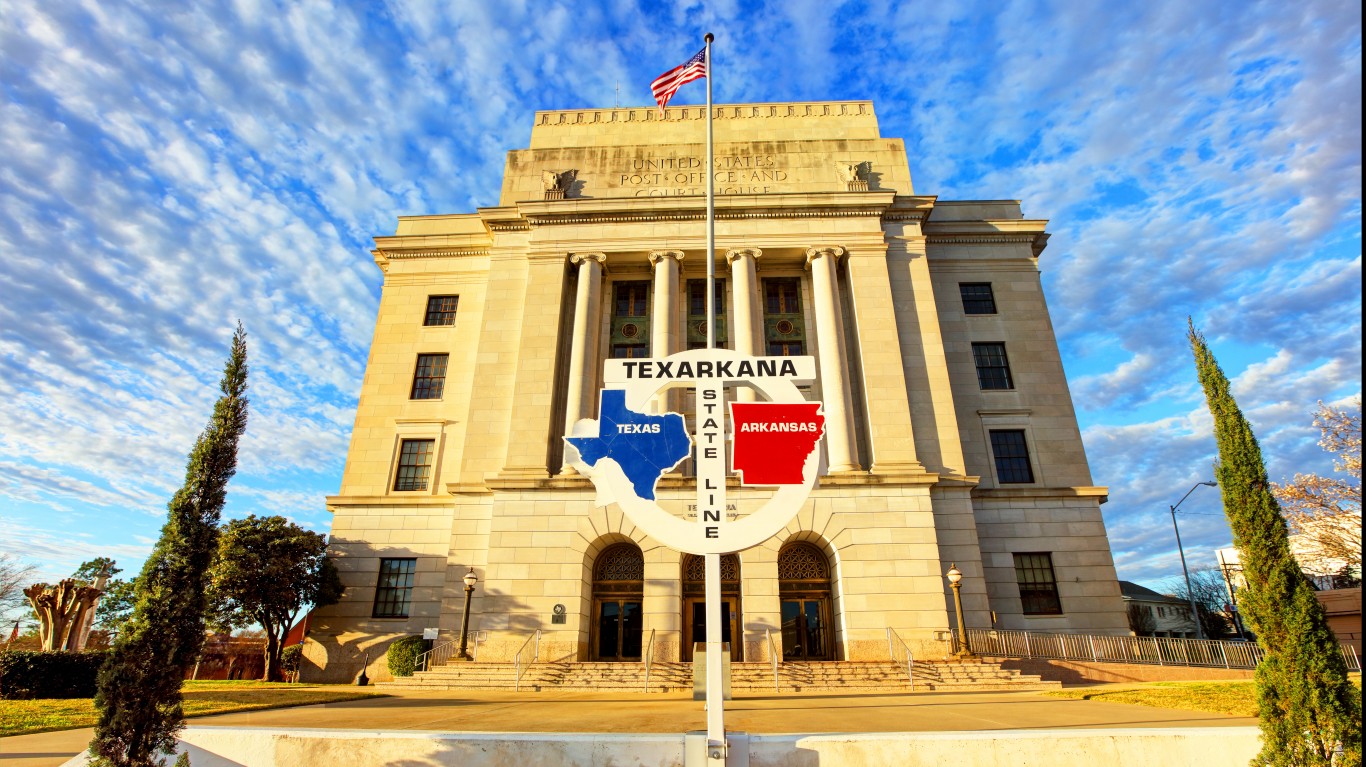
27. Texarkana, TX-AR
> Avg. hours worked per week: 39 hours, 54 minutes
> Avg. travel time to work: 20.7 minutes
> Income per capita: $26,165
> Largest private industry: Education and health services (16.3% of total employment)
In the Texarkana metropolitan area, which spans parts of Texas and Arkansas, the average worker logs 39 hours and 54 minutes per week, over an hour more than the national average. The longer average working day in the metro area is due in part to the share of local workers who are classified as full-time — defined as 35 hours or more per week by the U.S. Census Bureau. An estimated 80.7% of workers in Texarkana are full-time, compared to 78.1% of workers nationwide.
Despite the longer than average working hours, incomes are not especially high in the Texarkana metro area. Average income per capita in the area is just $26,165, well below the $35,672 national average.
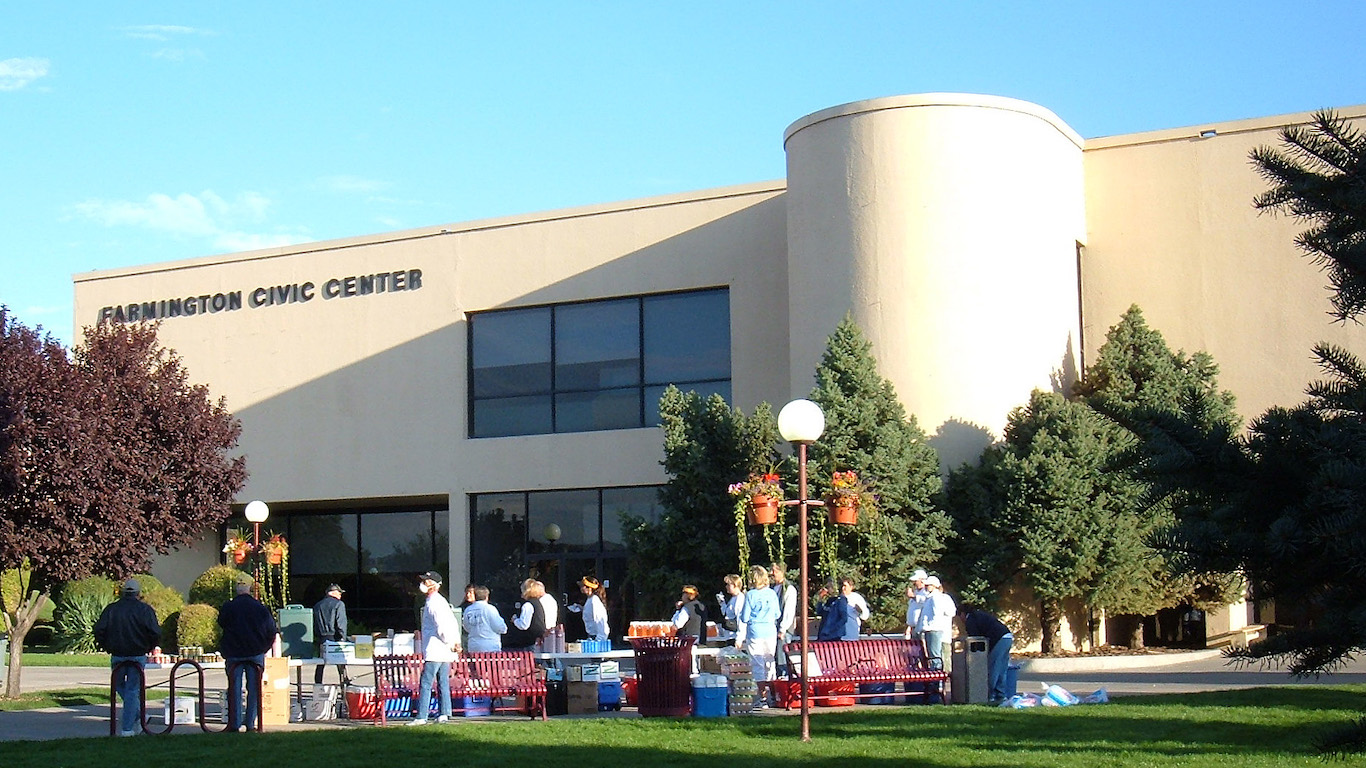
26. Farmington, NM
> Avg. hours worked per week: 39 hours, 54 minutes
> Avg. travel time to work: 22.8 minutes
> Income per capita: $21,626
> Largest private industry: N/A
Farmington is the only metropolitan area in New Mexico to rank among the cities with the longest average workweeks. Employed residents in the 16 to 64 age group work an average of 39 hours and 54 minutes a week, over an hour longer than the national average.
Job opportunities in Farmington are scarce and not especially well paying. As of August 2021, unemployment in the metro area stood at 8.5% — well above the 5.2% national average. Additionally, average income per capita in the area is just $21,626, well below the $35,672 national average.
[in-text-ad]

25. Shreveport-Bossier City, LA
> Avg. hours worked per week: 39 hours, 54 minutes
> Avg. travel time to work: 23.2 minutes
> Income per capita: $27,807
> Largest private industry: Education and health services (18.8% of total employment)
The average length of a workweek in Louisiana’s Shreveport-Bossier City metropolitan area is 39 hours and 54 minutes, over an hour longer than the national average. Despite longer than average working hours, incomes are not especially high in the Shreveport metro area. Average income per capita is just $27,807, well below the $35,672 national average.
Though workweeks are relatively long in the Shreveport-Bossier City metro area, a far smaller than average share of the population participates in the labor force. Only 56.5% of the 16 and older area population are working or actively looking for work, compared to nearly 64% of the working-age population nationwide.

24. Savannah, GA
> Avg. hours worked per week: 39 hours, 54 minutes
> Avg. travel time to work: 24.4 minutes
> Income per capita: $31,541
> Largest private industry: Education and health services (14.4% of total employment)
In the Savannah, Georgia, metro area, the average workweek is 39 hours and 54 minutes in length, the longest of any metro area in the state and one of the longest nationwide.
Like other metro areas with longer than average workweeks, employment opportunities in Savannah appear to be disproportionately full time. An estimated 80.2% of metro area workers are employed in full-time positions, compared to 78.1% of workers nationwide. Savannah’s job market is also relatively strong. Only 2.8% of the local labor force were unemployed as of August 2021, well below the 5.2% U.S. jobless rate.

23. Charleston, WV
> Avg. hours worked per week: 39 hours, 54 minutes
> Avg. travel time to work: 24.6 minutes
> Income per capita: $28,107
> Largest private industry: Education and health services (20.3% of total employment)
Charleston is the only metropolitan area in West Virginia to rank among the cities with the longest average workweeks. Employed residents in the 16 to 64 age group work an average of 39 hours and 54 minutes a week, over an hour longer than the national average. Though workweeks are relatively long in the metro area, a far smaller than average share of the population participates in the labor force. Less than 52% of the 16 and older area residents are working or actively looking for work, compared to nearly 64% of the working age population nationwide.
Like other metro areas with longer than average workweeks, employment opportunities in Charleston appear to be disproportionately full time. An estimated 82.5% of metro area workers are employed in full-time positions, compared to 78.1% of workers nationwide.
[in-text-ad-2]

22. Greeley, CO
> Avg. hours worked per week: 39 hours, 54 minutes
> Avg. travel time to work: 28.3 minutes
> Income per capita: $33,863
> Largest private industry: Mining, logging, and construction (16.2% of total employment)
Greeley is the only metropolitan area in Colorado to rank among the U.S. cities with the longest average workweeks. Employed residents in the 16 to 64 age group work an average of 39 hours and 54 minutes a week, over an hour longer than the national average.
Longer working hours in Greeley are due in part to the local industrial composition. The mining, logging, and construction sector has the longest average workweek among all industries in the United States. The sector is also the largest employer in Greeley, accounting for 16.2% of all jobs.

21. Sioux Falls, SD
> Avg. hours worked per week: 40 hours, 0 minutes
> Avg. travel time to work: 19.4 minutes
> Income per capita: $34,878
> Largest private industry: Education and health services (21.7% of total employment)
Sioux Falls, South Dakota, is one of only 21 U.S. metro areas where the military does not account for a disproportionate share of jobs and where the average workweek length is at least 40 hours.
Sioux Falls also has a strong job market and a high labor participation rate. As of August 2021, only 2.5% of the local labor force were unemployed, less than half the comparable national jobless rate of 5.2%. Additionally, nearly 74% of the metro area’s 16 and older population are in the labor force, well above the 63.1% national labor force participation rate.
[in-text-ad]

20. Amarillo, TX
> Avg. hours worked per week: 40 hours, 0 minutes
> Avg. travel time to work: 21.1 minutes
> Income per capita: $28,233
> Largest private industry: Education and health services (13.8% of total employment)
Amarillo is one of nine Texas metro areas where the average workweek is at least 40 hours in length. Despite longer than average working hours, incomes are not especially high in the metro area. Average income per capita in the area is just $28,233, well below the $35,672 national average.
Like other metro areas with longer than average workweeks, there appear to be more full-time employment opportunities in Amarillo than there are, on average, nationwide. An estimated 82.2% of metro area workers are employed in full-time positions, compared to 78.1% of workers nationwide.

19. Staunton, VA
> Avg. hours worked per week: 40 hours, 0 minutes
> Avg. travel time to work: 22.4 minutes
> Income per capita: $30,079
> Largest private industry: N/A
In Staunton, Virginia, the average workweek is 40 hours in length — over an hour longer than the national average. Despite longer than average working hours, incomes are not especially high in the Staunton metro area. Average income per capita in the area is just $30,079, well below the $35,672 national average.
Like other metro areas with longer than average workweeks, employment opportunities in Staunton appear to be disproportionately full time. An estimated 80.3% of metro area workers are employed in full-time positions, compared to 78.1% of workers nationwide.

18. Corpus Christi, TX
> Avg. hours worked per week: 40 hours, 6 minutes
> Avg. travel time to work: 20.9 minutes
> Income per capita: $27,286
> Largest private industry: Education and health services (17.4% of total employment)
The average workweek in the Corpus Christi, Texas, metro area is 40 hours and 6 minutes in length — longer than in the vast majority of other U.S. metro areas.
The job market in Corpus Christi is relatively weak. As of August 2021, 7.2% of the local labor force were unemployed, well above the 5.2% national jobless rate. For those who are working, wages tend to be relatively low, despite the longer working hours. Average income per capita in the area is just $27,286, well below the $35,672 national average.
[in-text-ad-2]

17. Owensboro, KY
> Avg. hours worked per week: 40 hours, 6 minutes
> Avg. travel time to work: 22.7 minutes
> Income per capita: $29,270
> Largest private industry: Education and health services (19.1% of total employment)
With a 40 hour and 6 minute average workweek, Owensboro is one of two Kentucky metro areas to rank among the U.S. cities with the longest workweeks.
Americans employed in the manufacturing sector tend to work longer hours than those in most other industries, and in the Owensboro metro area, 17.3% of workers are employed in manufacturing — double the share of all U.S. workers in manufacturing occupations.
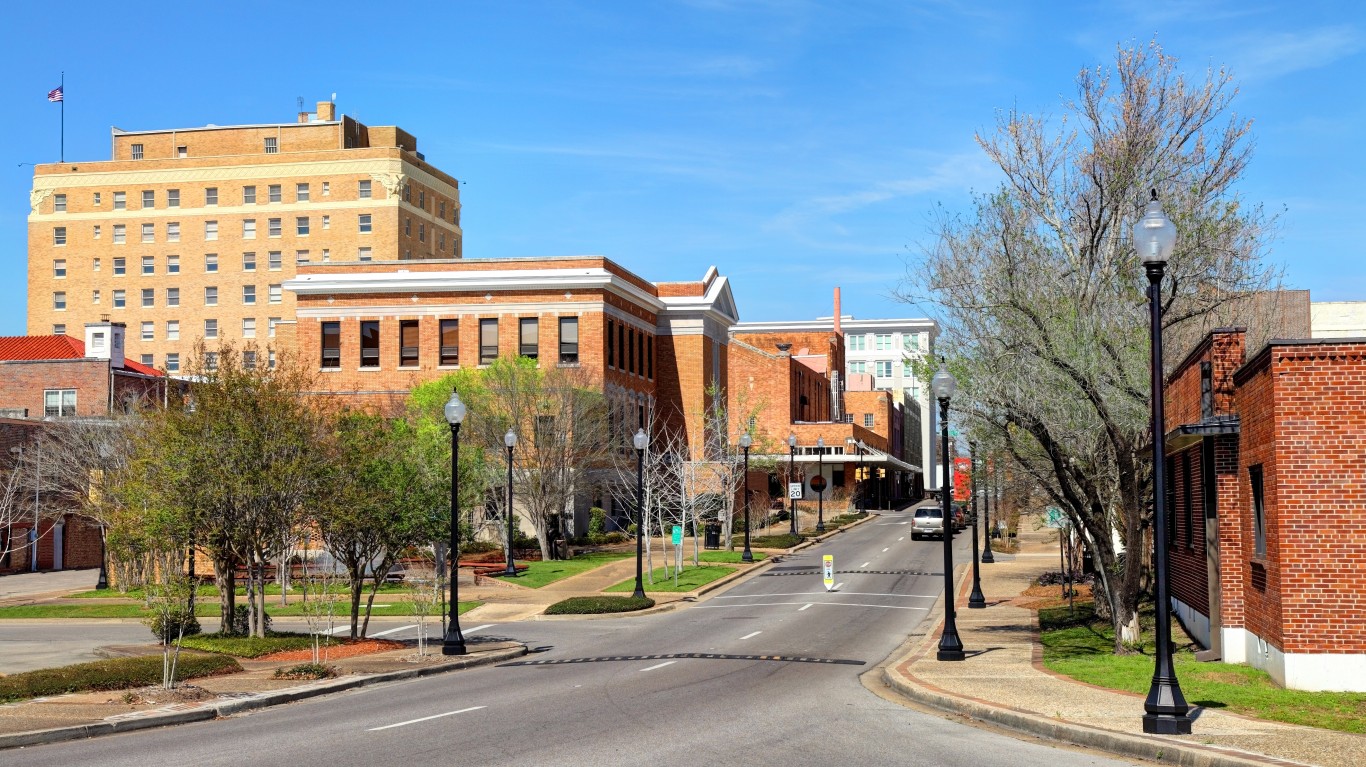
16. Hattiesburg, MS
> Avg. hours worked per week: 40 hours, 6 minutes
> Avg. travel time to work: 22.8 minutes
> Income per capita: $25,247
> Largest private industry: Retail trade (13.7% of total employment)
The average workweek in the Hattiesburg, Mississippi, metro area is 40 hours and six minutes in length — longer than in the vast majority of other U.S. metro areas.
Wages tend to be relatively low in Hattiesburg, despite longer working hours. Average income per capita in the area is just $25,247, well below the $35,672 national average.
[in-text-ad]
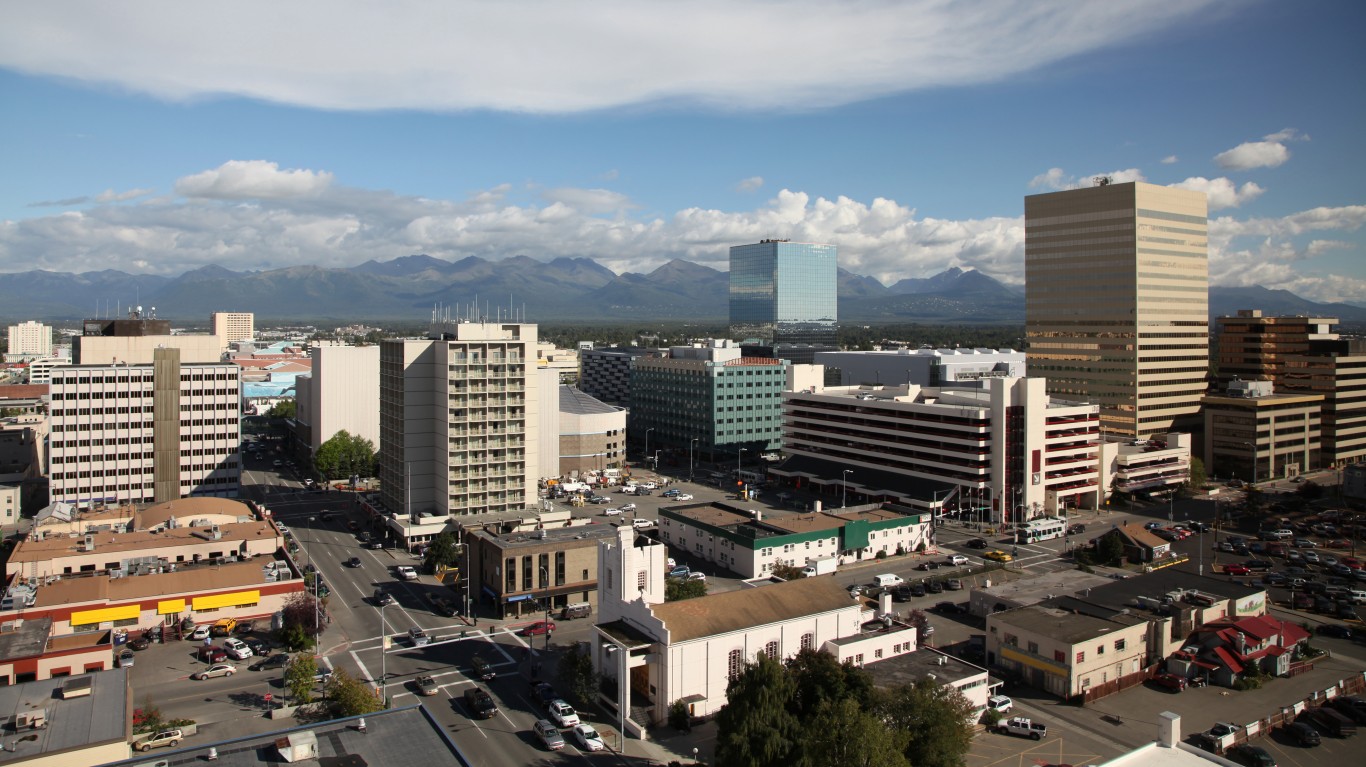
15. Anchorage, AK
> Avg. hours worked per week: 40 hours, 6 minutes
> Avg. travel time to work: 23.1 minutes
> Income per capita: $38,842
> Largest private industry: Education and health services (18.8% of total employment)
The average workweek in the Anchorage, Alaska, metro area is 40 hours and six minutes, far longer than the national average. In Anchorage, incomes reflect the longer workweeks. Average income per capita in the metro area is $38,842, higher than the $35,672 national average.
The longer workweeks are attributable in part to the industrial composition in Anchorage. For example, resource extraction and utilities are two industries with longer than average workweeks nationwide, and a larger than typical share of workers are employed in these industries in Anchorage.

14. Dallas-Fort Worth-Arlington, TX
> Avg. hours worked per week: 40 hours, 6 minutes
> Avg. travel time to work: 28.6 minutes
> Income per capita: $36,274
> Largest private industry: Professional and business services (17.1% of total employment)
With a 40 hour and 6 minute average workweek, Dallas is one of several Texas metro areas to rank among the U.S. cities with the longest workweeks. Like other metro areas with longer than average workweeks, employment opportunities in Dallas appear to be disproportionately full time. An estimated 82.1% of metro area workers are employed in full-time positions, compared to 78.1% of workers nationwide.
The area’s longer workweeks are also attributable to the local industrial composition. For example, wholesale trade and utilities are two industries with longer than average workweeks nationwide, and a larger than typical share of workers are employed in these industries in Dallas.

13. Charleston-North Charleston, SC
> Avg. hours worked per week: 40 hours, 18 minutes
> Avg. travel time to work: 27.6 minutes
> Income per capita: $38,050
> Largest private industry: Professional and business services (15.5% of total employment)
In the Charleston metro area, the average workweek among those in the 16 to 64 age range is 40 hours and 18 minutes — the longest of any non-military city in South Carolina and one of the longest nationwide. Incomes reflect the longer workweeks in Charleston as average income per capita in the metro area is $38,050, higher than the $35,672 national average.
Employment opportunities in Charleston appear to be disproportionately full time. An estimated 83.2% of metro area workers are employed in full-time positions, compared to 78.1% of workers nationwide.
[in-text-ad-2]

12. Houston-The Woodlands-Sugar Land, TX
> Avg. hours worked per week: 40 hours, 18 minutes
> Avg. travel time to work: 30.7 minutes
> Income per capita: $35,190
> Largest private industry: Professional and business services (16.3% of total employment)
The average workweek in the Houston metro area is 40 hours and 18 minutes, about an hour and half longer than the national average. Commute times are also relatively long in Houston. The average travel time to work in the metro area is 30.7 minutes compared to 27.6 minutes nationwide — a difference that adds up to more than a half hour over the course of a workweek.
The longer workweeks are also attributable in part to the area’s industrial composition. For example, wholesale trade, resource extraction, and utilities are three industries with longer than average workweeks nationwide, and a larger than typical share of workers are employed in these industries in Houston.
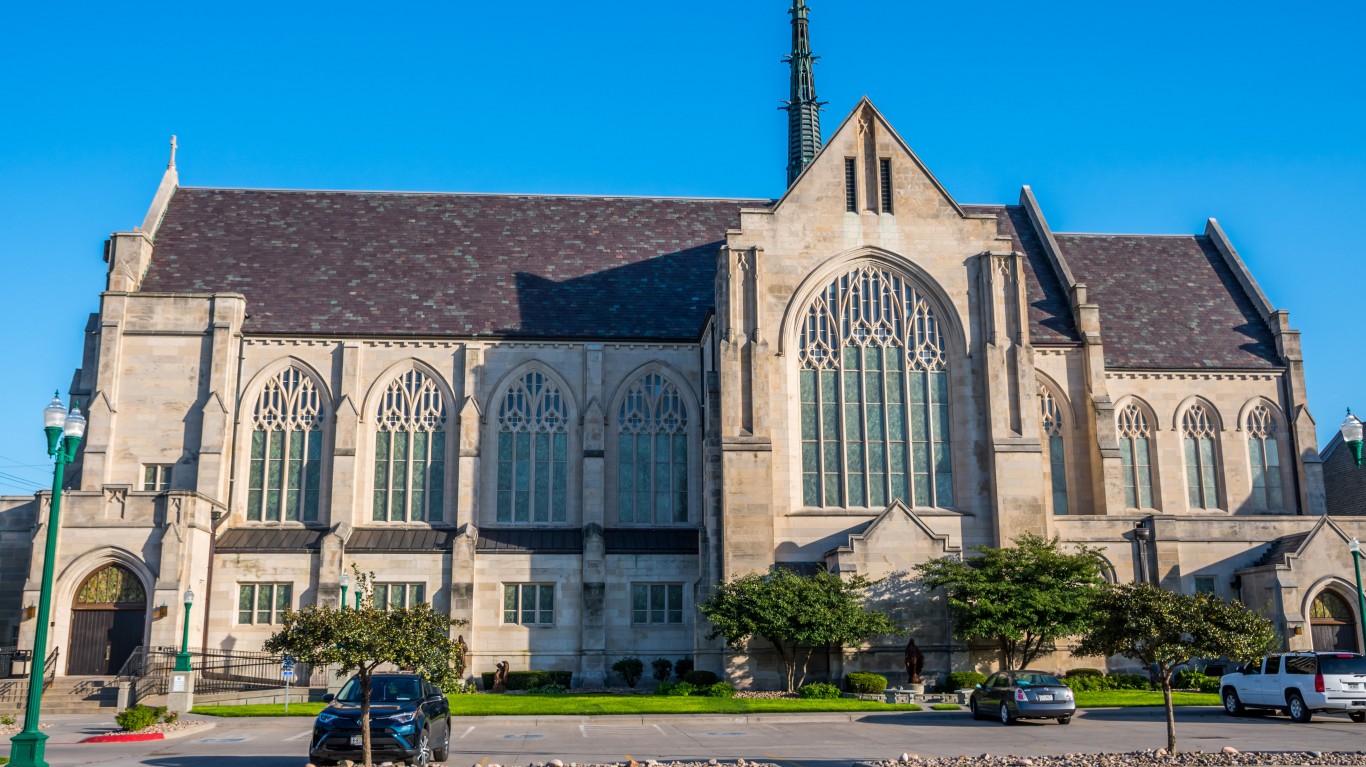
11. Grand Island, NE
> Avg. hours worked per week: 40 hours, 30 minutes
> Avg. travel time to work: 20.5 minutes
> Income per capita: $29,504
> Largest private industry: N/A
The Grand Island, Nebraska, metro area has an average workweek of 40 hours and 30 minutes in length, longer than in the vast majority of U.S. metropolitan areas and significantly longer than the national average.
Grand Island also has a strong job market and a high labor participation rate. As of August 2021, only 2.5% of the local labor force were unemployed, less than half the comparable national unemployment rate of 5.2%. Additionally, over 70% of the metro area’s 16 and older population are in the labor force, well above the 63.6% national labor force participation rate.
[in-text-ad]
10. Houma-Thibodaux, LA
> Avg. hours worked per week: 40 hours, 30 minutes
> Avg. travel time to work: 26.8 minutes
> Income per capita: $27,421
> Largest private industry: Retail trade (12.2% of total employment)
The Houma-Thibodaux, Louisiana, metro area has an average workweek of 40 hours and 30 minutes, the second longest of any non-military city in the state and 10th longest nationwide. The average workweek nationwide is nearly two hours shorter.
Longer workweeks are partially attributable to the area’s industrial composition. For example, the mining, logging, and construction sector has the longest workweek on average nationwide — and in Houma-Thibodaux, it accounts for 11.6% of all jobs, more than double the comparable 5.5% share nationwide.
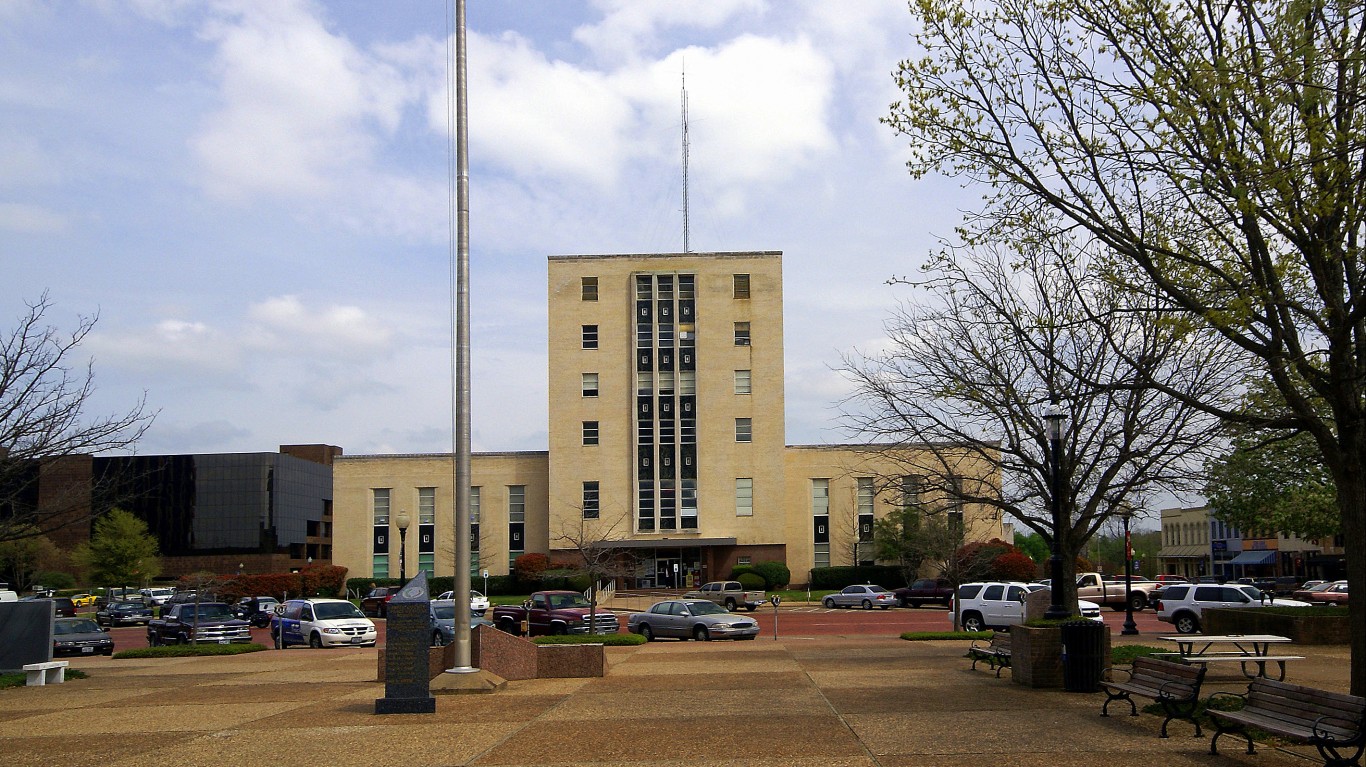
9. Tyler, TX
> Avg. hours worked per week: 40 hours, 36 minutes
> Avg. travel time to work: 25.9 minutes
> Income per capita: $29,053
> Largest private industry: Education and health services (22.5% of total employment)
Six of the 10 U.S. metro areas with the longest average workweek are located in Texas — and the East Texas city of Tyler is one of them. Area workers put in 40 hours and 36 minutes each week on average, nearly two hours longer than the national average.
Employment opportunities in Tyler appear to be disproportionately full time. An estimated 80.8% of metro area workers are employed in full-time positions, compared to 78.1% of workers nationwide.

8. Alexandria, LA
> Avg. hours worked per week: 40 hours, 36 minutes
> Avg. travel time to work: 27.9 minutes
> Income per capita: $26,715
> Largest private industry: Retail trade (12.3% of total employment)
Workers in Alexandria put in the most hours each week on average of any Louisiana metro area and the eighth most nationwide. Among all workers between the ages of 16 and 64 in the metro area, the average workweek is 40 hours and 36 minutes — nearly two hours longer than the national average.
Despite longer than average working hours, incomes are not especially high in Alexandria. Average income per capita in the area is just $26,715, well below the $35,672 national average.
[in-text-ad-2]
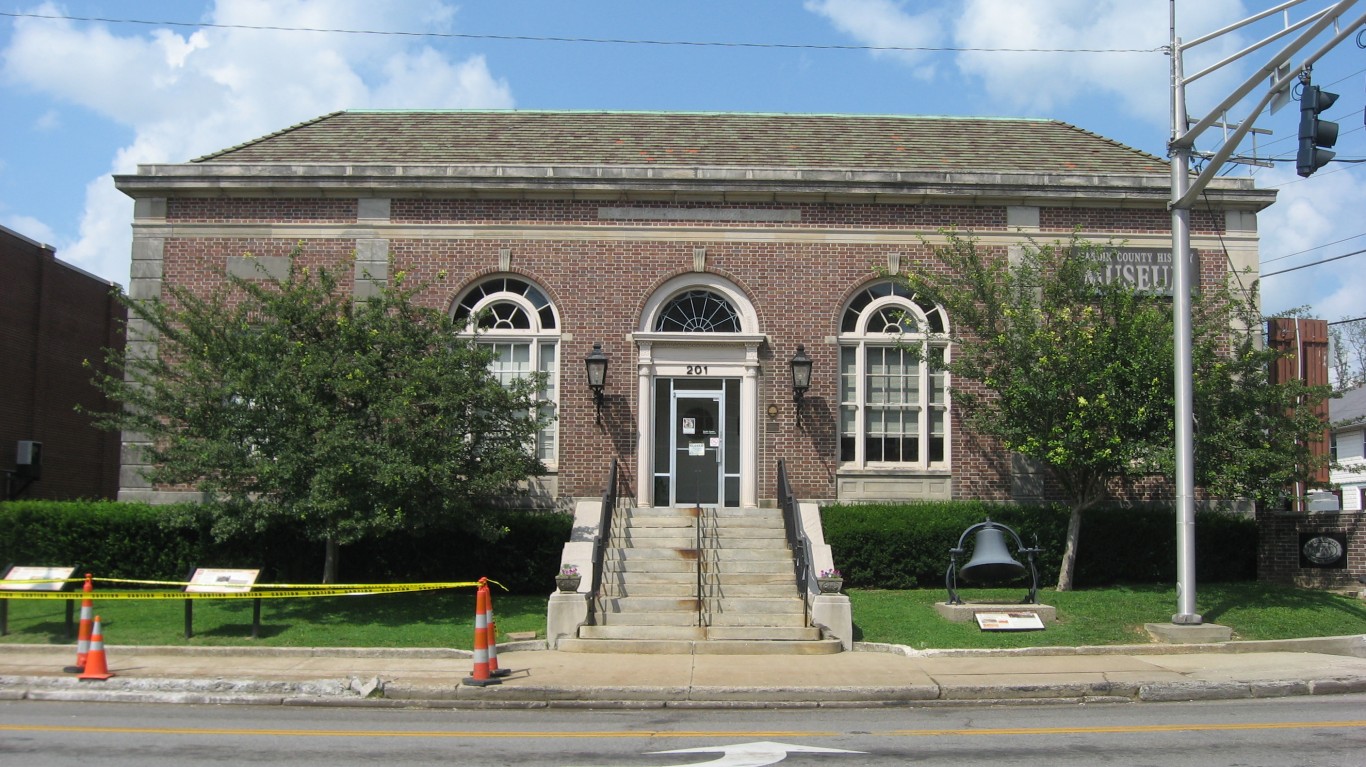
7. Elizabethtown-Fort Knox, KY
> Avg. hours worked per week: 40 hours, 48 minutes
> Avg. travel time to work: 25.5 minutes
> Income per capita: $28,963
> Largest private industry: Manufacturing (14.0% of total employment)
Workers in the Elizabeth-Fort Knox metro area put in the most hours each week on average of any Kentucky metro area and seventh most nationwide. Among all workers between the ages of 16 and 64 in the metro area, the average workweek is 40 hours and 48 minutes — two hours longer than the national average.
Americans employed in the manufacturing sector tend to work longer hours than those in most other industries, and in the Elizabethtown-Fort Knox metro area, manufacturing is the largest non-government sector by employment. Manufacturing employs 14% of all metro area workers, compared to less than 9% of all U.S. workers.
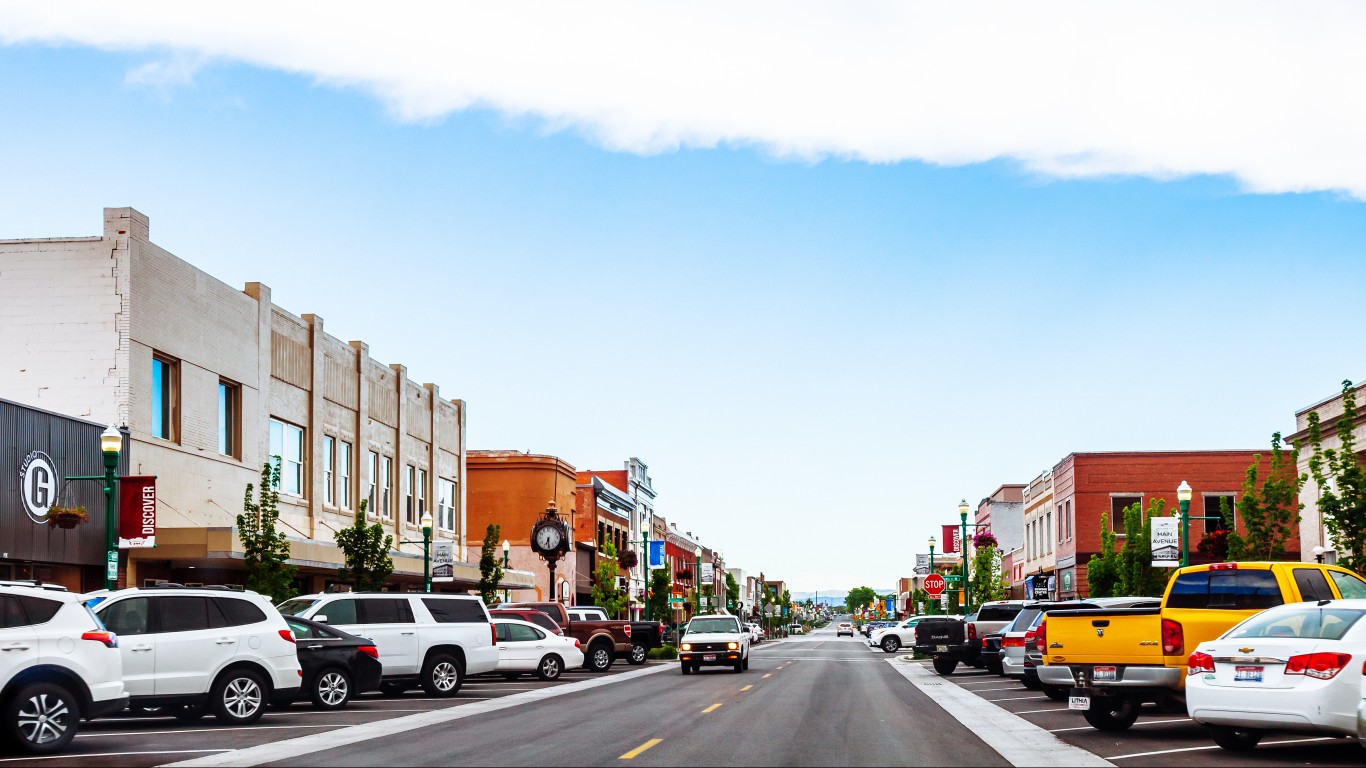
6. Twin Falls, ID
> Avg. hours worked per week: 40 hours, 54 minutes
> Avg. travel time to work: 18.4 minutes
> Income per capita: $26,923
> Largest private industry: N/A
The average workweek in the Twin Falls, Idaho metro area is 40 hours and 54 minutes — longer than in all but five other U.S. metro areas and more than two hours longer than the national average.
While workers tend to work more hours per week in Twin Falls, they are also more likely to benefit from shorter commute times. The typical travel time to work in the metro area is just 18.4 minutes, over nine minutes below the national average. Over the course of a workweek, the shorter commute adds up to over an hour and a half.
[in-text-ad]
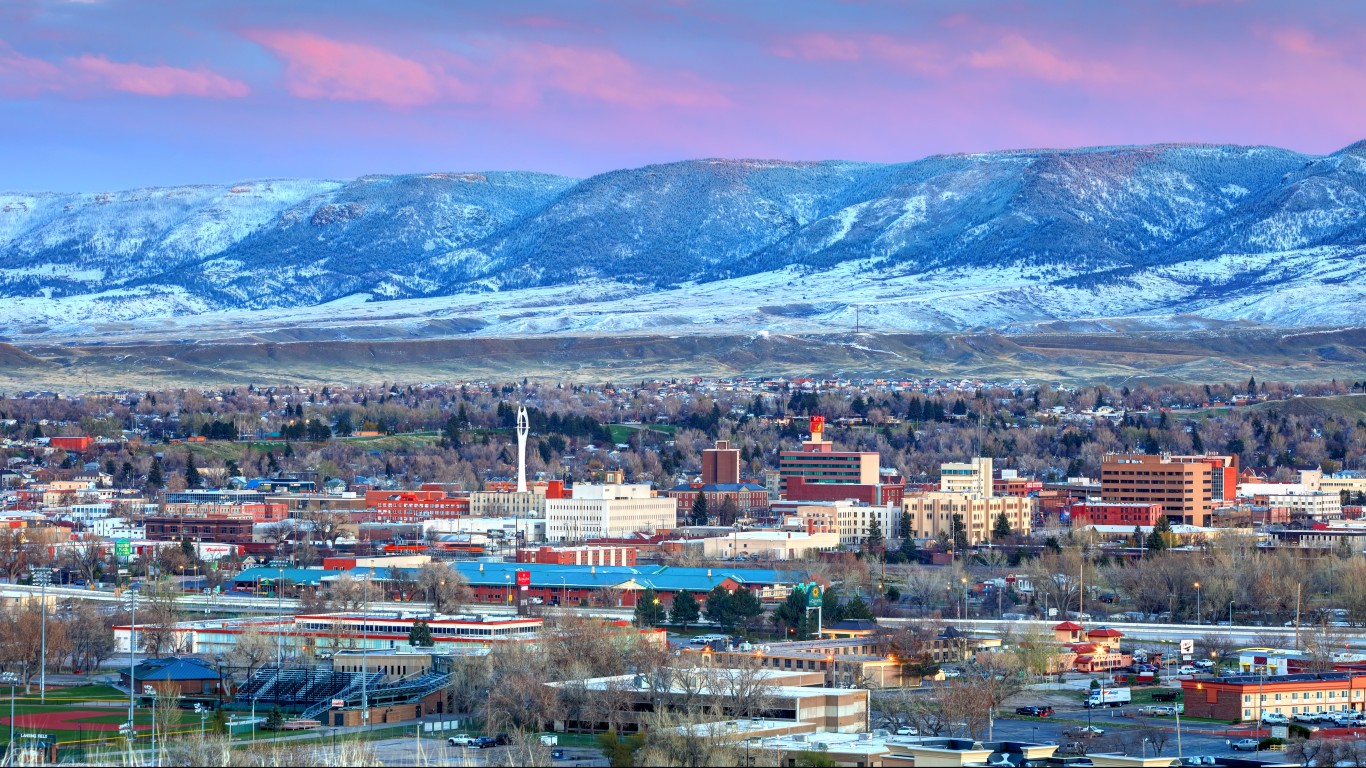
5. Casper, WY
> Avg. hours worked per week: 41 hours, 12 minutes
> Avg. travel time to work: 18.3 minutes
> Income per capita: $32,934
> Largest private industry: Education and health services (16.5% of total employment)
The average workweek in Casper, Wyoming, is 41 hours and 12 minutes, making the metro area one of only five nationwide — and the only one not in Texas — where the average workweek exceeds 41 hours. Longer workweeks are partially attributable to the area’s industrial composition. For example, the mining, logging, and construction sector has the longest workweek on average nationwide — and in Casper, it is the second largest non-government employer, accounting for 12.4% of all jobs.
While workers tend to work more hours per week in Casper, they are also more likely to benefit from shorter commute times. The typical travel time to work in the metro area is just 18.3 minutes, over nine minutes below the national average. Over the course of a workweek, the shorter commute adds up to over an hour and a half.
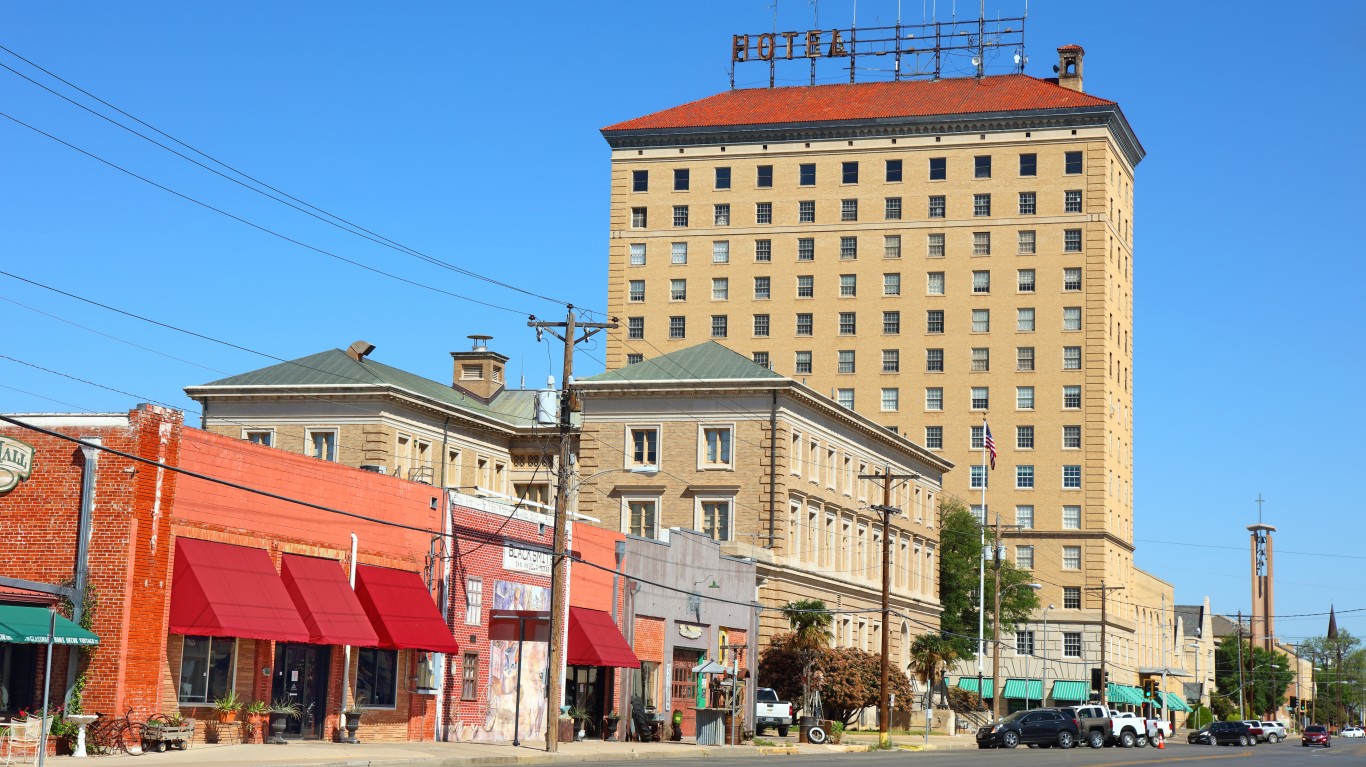
4. San Angelo, TX
> Avg. hours worked per week: 41 hours, 24 minutes
> Avg. travel time to work: 20.3 minutes
> Income per capita: $29,184
> Largest private industry: Education and health services (16.6% of total employment)
With a 41 hour and 24 minute average workweek, San Angelo is one of several Texas metro areas to rank among the U.S. cities with the longest workweeks. Like other metro areas with longer than average workweeks, employment opportunities in San Angelo appear to be disproportionately full time. An estimated 81.3% of metro area workers are employed in full-time positions, compared to 78.1% of workers nationwide.
While workers tend to work more hours per week in San Angelo, they are also more likely to benefit from shorter commute times. The typical travel time to work in the metro area is just 20.3 minutes, over seven minutes below the national average. Over the course of a workweek, the shorter commute adds up to over an hour.
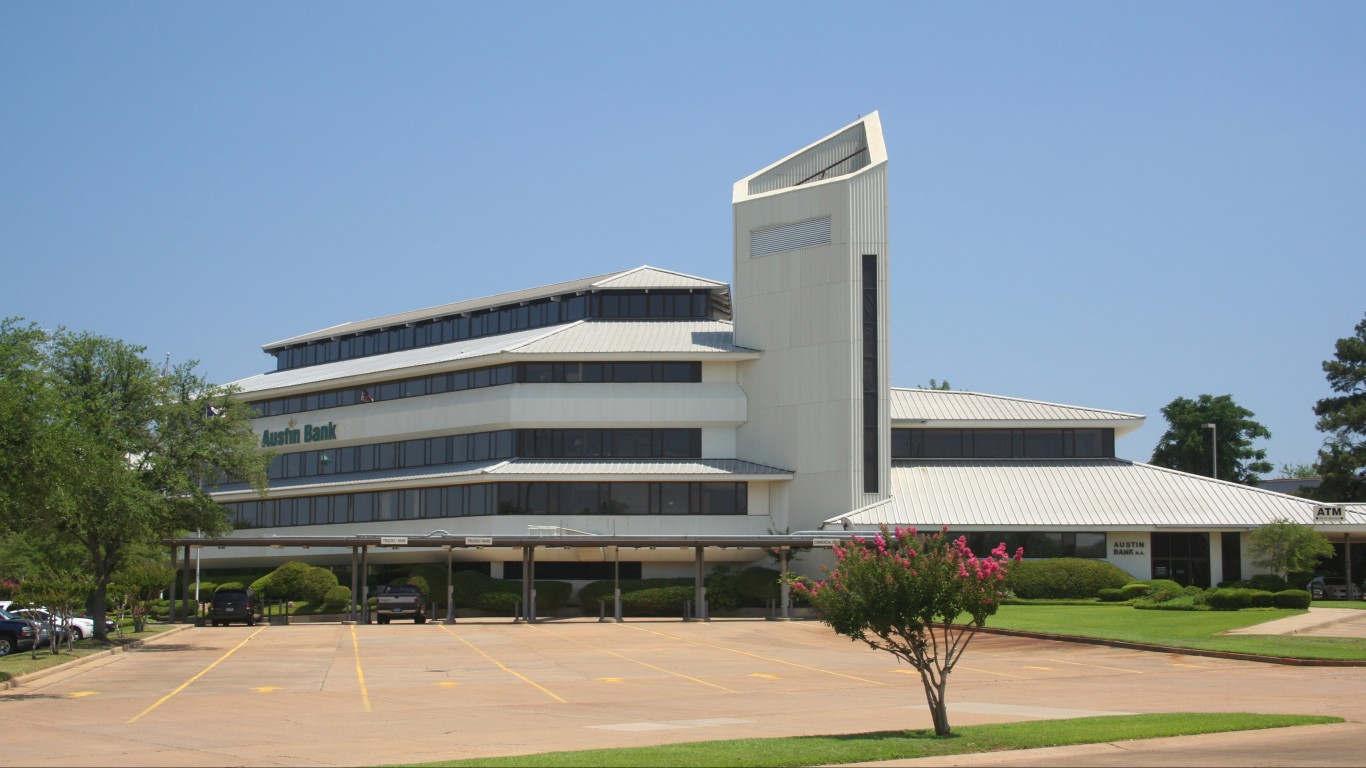
3. Longview, TX
> Avg. hours worked per week: 41 hours, 30 minutes
> Avg. travel time to work: 24.1 minutes
> Income per capita: $28,898
> Largest private industry: Education and health services (16.4% of total employment)
The average workweek in Longview, Texas, is 41 hours and 12 minutes, making the metro area one of only five nationwide — where the military accounts for less than 10% of employment — where the average workweek exceeds 41 hours. The area’s longer workweeks are partially attributable to the local industrial composition. For example, the mining, logging, and construction sector has the longest workweek on average nationwide — and in Longview, it is the second largest non-government employer, accounting for 13.5% of all jobs.
Despite longer than average working hours, incomes are not especially high in the Longview metro area. Average income per capita in the area is just $28,898, well below the $35,672 national average.
[in-text-ad-2]

2. Midland, TX
> Avg. hours worked per week: 42 hours, 6 minutes
> Avg. travel time to work: 20.6 minutes
> Income per capita: $37,108
> Largest private industry: Mining, logging, and construction (30.5% of total employment)
The average workweek in Midland, Texas, is 42 hours and 6 minutes, making the metro area one of only two nationwide — where the military accounts for less than 10% of employment — where the average workweek exceeds 42 hours. Longer workweeks are partially attributable to the area’s industrial composition. For example, the mining, logging, and construction sector has the longest workweek on average nationwide — and in Midland, it is the by far the largest employer, accounting for 30.5% of all jobs.
In Midland, incomes reflect the longer workweeks. Average income per capita in the metro area is $37,108, higher than the $35,672 national average.

1. Odessa, TX
> Avg. hours worked per week: 42 hours, 48 minutes
> Avg. travel time to work: 24.5 minutes
> Income per capita: $28,582
> Largest private industry: Mining, logging, and construction (21.7% of total employment)
In Odessa, Texas, the average workweek is 42 hours and 48 minutes in length — by far the longest of any U.S. metro area and 4 hours longer than the national average. Mining, logging, and construction has the longest average working week nationwide of any sector. It is also the largest sector in the Odessa metro area by employment, accounting for more than one in every five jobs. Nationwide, the same sector accounts for only about one in every 18 jobs.
Odessa’s job market is weak. As of August 2021, 8.8% of the local labor force were unemployed, well above the 5.2% national jobless rate. For those who are working, wages tend to be relatively low, despite longer working hours. Average income per capita in the area is just $28,582, well below the $35,672 national average.
Methodology
To determine the cities with the longest workweeks, 24/7 Wall St. reviewed one-year data on mean hours worked per week among full time and part time workers from the U.S. Census Bureau’s 2019 American Community Survey. Metropolitan statistical areas were ranked based on the mean usual hours worked for workers age 16 to 64. Only cities where employment in the armed forces constitutes less than 10% the labor force were considered.
Supplemental data on employment by industry, as well as national estimates of average hours worked per week and average hourly wage by industry came from the Bureau of Labor Statistics and are for 2020. Data on mean travel time to work, per capita income, and armed forces employment came from the 2019 ACS.
In the case of a tie, the metro area with the longer average commute time ranked higher.
Is Your Money Earning the Best Possible Rate? (Sponsor)
Let’s face it: If your money is just sitting in a checking account, you’re losing value every single day. With most checking accounts offering little to no interest, the cash you worked so hard to save is gradually being eroded by inflation.
However, by moving that money into a high-yield savings account, you can put your cash to work, growing steadily with little to no effort on your part. In just a few clicks, you can set up a high-yield savings account and start earning interest immediately.
There are plenty of reputable banks and online platforms that offer competitive rates, and many of them come with zero fees and no minimum balance requirements. Click here to see if you’re earning the best possible rate on your money!
Thank you for reading! Have some feedback for us?
Contact the 24/7 Wall St. editorial team.
 24/7 Wall St.
24/7 Wall St. 24/7 Wall St.
24/7 Wall St. 24/7 Wall St.
24/7 Wall St.
 24/7 Wall St.
24/7 Wall St.

